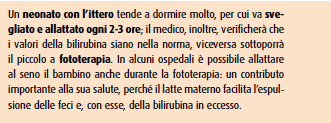 As mentioned, very often the newborn (but also the baby of a few months) falls asleep at the breast. Here there are two cases: lightning feed, which tends to imply a second round at a short distance; eternal but ineffective feeding, because the little one sucks with little vigor and wakes up every time you try to remove him, resuming the suction, even if for a short time. These are very common situations for all breastfed infants; the important thing is that they don't become the rule, otherwise the child may not receive the nourishment necessary to grow. In this case, the ideal is to contact a breastfeeding consultant or, alternatively, a midwife or pediatrician, who will be able to reassure the mother and direct her appropriately. Even the bottle-fed baby frequently falls asleep while drinking. In these situations, the risk is that he swallows air: it is therefore better to wake him up gently, lean him on your shoulder and massage his back to make him burp, and then try to offer him the bottle again and resume feeding.
First days at home with the baby? You might be interested in this article: First days together: what is it for?
Taken from Born Mom | by Sara Lanfranchini
As mentioned, very often the newborn (but also the baby of a few months) falls asleep at the breast. Here there are two cases: lightning feed, which tends to imply a second round at a short distance; eternal but ineffective feeding, because the little one sucks with little vigor and wakes up every time you try to remove him, resuming the suction, even if for a short time. These are very common situations for all breastfed infants; the important thing is that they don't become the rule, otherwise the child may not receive the nourishment necessary to grow. In this case, the ideal is to contact a breastfeeding consultant or, alternatively, a midwife or pediatrician, who will be able to reassure the mother and direct her appropriately. Even the bottle-fed baby frequently falls asleep while drinking. In these situations, the risk is that he swallows air: it is therefore better to wake him up gently, lean him on your shoulder and massage his back to make him burp, and then try to offer him the bottle again and resume feeding.
First days at home with the baby? You might be interested in this article: First days together: what is it for?
Taken from Born Mom | by Sara Lanfranchini

Your baby of a few weeks, who until now has accustomed you to frequent and regular feedings (the average for a newborn is 8-12 daily milk intakes), one day without warning extends the times and sleeps more than usual . It's the first time and, instead of enjoying this unexpected moment of quiet – which you could take advantage of to stretch your legs, take a shower or make a phone call, read a book… – a worry assails you: maybe he's sleeping too much, maybe something it doesn't work and I should wake him up . Clearly, each case is unique and should be examined in its specificity, but in general a slightly longer bedtime does not imply anything negative. If the child does at least 8 breastfeeds a day , if he regularly wets the diapers with clear pee , if the stool discharges are at least 3 or 5 (we are talking about the first 6 weeks, approximately, afterwards the rhythms vary from subject to subject), if the baby grows well, is healthy, responsive and makes itself felt when he is hungry – and if, in the case of breastfeeding, the breast does not engorge due to the longer times – then let the baby sleep in peace . You will also see that, in all likelihood, this particularly long sleep will not be the new rule of the little one but a simple exception, and that from tomorrow the usual frenetic rhythm will be restored. Yes, because the problem of many breastfeeding women – we will in fact see that, with artificial milk, the rhythms can be different – is rather the opposite: very frequent feedings which imply great availability on the part of the mother, for whom breastfeeding , more than a pleasure and a magical moment of relationship with the child, risks becoming, at least sometimes, a source of stress. Here then is that, under normal conditions, that extra hour of sleep must be recorded and lived in complete serenity.
THERE IS MILK AND MILK
Another variable that often influences the rhythms of wakefulness and sleep and the frequency of feedings is the type of feeding of the infant. While breast milk hardly needs digestion, formulated milk requires a rather long and laborious digestive process (about 4 hours), which generates drowsiness because the body is entirely engaged in this task; a bit like what happens to each of us after a substantial meal. Therefore, bedtime sessions of probably different lengths follow. Furthermore, while on the one hand artificial milk maintains its characteristics unchanged with each intake, maternal milk changes continuously (and we are not talking about its physiological change as a function of the baby's growth). There are many factors: with each feeding , the first milk is much less fat and full-bodied than the second (which arrives after about 10 minutes) and for this reason it is more suited to quenching thirst than to nourishing; therefore, a short feed will easily be followed by another a short distance away, and the nap between the two will be reduced to a minimum. It should also be borne in mind that at night the milk is richer and more satiating than during the day. Finally, sometimes the baby sucks out of a desire to be cuddled, to soothe a pain or to fall asleep – you will see that the most natural thing of the world, or falling asleep when tired, can become a feat for a newborn – thus taking advantage not so much of the sense of satiety as of the warmth and protection that the mother's womb offers. In all these cases, the amount of milk ingested could be minimal, but not verifiable (with the bottle, on the other hand, it becomes immediately clear how much milk has been consumed).
WHEN TO WAKE UP THE BABY?
Based on what has been said, it is clear that there are cases in which it is advisable to wake up the child who sleeps for a very long time. The conditions are essentially these:
■ low growth or not yet fully clear;
■ few, if not very few, dirty diapers;
■ preterm birth and newborn struggling to gain weight.
In general, a child who is not growing well should be woken up every 2-3 hours during the day and, if necessary, even every 4 hours at night. Still speaking of breastfeeding, even a breast that is 'bursting', extremely swollen or sore, authorizes the mother to wake up the baby (alternatively, you can always use the breast pump): breastfeeding on demand should in fact be understood as a relationship based on reciprocity, which must offer both the correct satisfaction.
THE CHILD WHO FALLS ASLEEP DRINKING  As mentioned, very often the newborn (but also the baby of a few months) falls asleep at the breast. Here there are two cases: lightning feed, which tends to imply a second round at a short distance; eternal but ineffective feeding, because the little one sucks with little vigor and wakes up every time you try to remove him, resuming the suction, even if for a short time. These are very common situations for all breastfed infants; the important thing is that they don't become the rule, otherwise the child may not receive the nourishment necessary to grow. In this case, the ideal is to contact a breastfeeding consultant or, alternatively, a midwife or pediatrician, who will be able to reassure the mother and direct her appropriately. Even the bottle-fed baby frequently falls asleep while drinking. In these situations, the risk is that he swallows air: it is therefore better to wake him up gently, lean him on your shoulder and massage his back to make him burp, and then try to offer him the bottle again and resume feeding.
First days at home with the baby? You might be interested in this article: First days together: what is it for?
Taken from Born Mom | by Sara Lanfranchini
As mentioned, very often the newborn (but also the baby of a few months) falls asleep at the breast. Here there are two cases: lightning feed, which tends to imply a second round at a short distance; eternal but ineffective feeding, because the little one sucks with little vigor and wakes up every time you try to remove him, resuming the suction, even if for a short time. These are very common situations for all breastfed infants; the important thing is that they don't become the rule, otherwise the child may not receive the nourishment necessary to grow. In this case, the ideal is to contact a breastfeeding consultant or, alternatively, a midwife or pediatrician, who will be able to reassure the mother and direct her appropriately. Even the bottle-fed baby frequently falls asleep while drinking. In these situations, the risk is that he swallows air: it is therefore better to wake him up gently, lean him on your shoulder and massage his back to make him burp, and then try to offer him the bottle again and resume feeding.
First days at home with the baby? You might be interested in this article: First days together: what is it for?
Taken from Born Mom | by Sara Lanfranchini
 As mentioned, very often the newborn (but also the baby of a few months) falls asleep at the breast. Here there are two cases: lightning feed, which tends to imply a second round at a short distance; eternal but ineffective feeding, because the little one sucks with little vigor and wakes up every time you try to remove him, resuming the suction, even if for a short time. These are very common situations for all breastfed infants; the important thing is that they don't become the rule, otherwise the child may not receive the nourishment necessary to grow. In this case, the ideal is to contact a breastfeeding consultant or, alternatively, a midwife or pediatrician, who will be able to reassure the mother and direct her appropriately. Even the bottle-fed baby frequently falls asleep while drinking. In these situations, the risk is that he swallows air: it is therefore better to wake him up gently, lean him on your shoulder and massage his back to make him burp, and then try to offer him the bottle again and resume feeding.
First days at home with the baby? You might be interested in this article: First days together: what is it for?
Taken from Born Mom | by Sara Lanfranchini
As mentioned, very often the newborn (but also the baby of a few months) falls asleep at the breast. Here there are two cases: lightning feed, which tends to imply a second round at a short distance; eternal but ineffective feeding, because the little one sucks with little vigor and wakes up every time you try to remove him, resuming the suction, even if for a short time. These are very common situations for all breastfed infants; the important thing is that they don't become the rule, otherwise the child may not receive the nourishment necessary to grow. In this case, the ideal is to contact a breastfeeding consultant or, alternatively, a midwife or pediatrician, who will be able to reassure the mother and direct her appropriately. Even the bottle-fed baby frequently falls asleep while drinking. In these situations, the risk is that he swallows air: it is therefore better to wake him up gently, lean him on your shoulder and massage his back to make him burp, and then try to offer him the bottle again and resume feeding.
First days at home with the baby? You might be interested in this article: First days together: what is it for?
Taken from Born Mom | by Sara Lanfranchini
Categorie del blog
Volantino Iperbimbo


